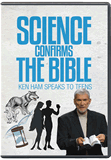De-Nyeing Science
Bill Nye, “the Science Guy” of children’s TV, has a new message: belief in creation endangers our children and threatens our economy. Evolution, he says, is the basis for science. Apparently he still hasn’t learned some of the basics, like “What is science?”
Is evolution necessary for science? Bill Nye, the star of the children’s TV show Bill Nye the Science Guy, seems to think so. In a YouTube video last year, he belittled the teaching of creation and crowed, “Evolution is the fundamental idea in all of life science, in all of biology.”
Joshua Rosenau, who directs policy at a major organization that fights to keep creation out of public education (the National Center for Science Education), raised a similar alarm: “Students around the world are [being] deprived of lessons on evolution—the foundation of modern biology—leaving them without the tools to understand and participate in the revolutions in biotechnology, biomedicine, and genomics that will define society in this century.”
These men fail to recognize the difference between observational and historical science. Observational science is “here and now” science that scientists do every day in the lab. This type of science, which can be observed, tested, and repeated, gives us modern technology like airplanes, computers, and vaccines.
Historical science, such as creation and evolution, is very different. It examines past events that cannot be directly observed, tested, or repeated. So it has little to do with modern technology and is very dependent on a person’s worldview. When it comes to the origin of living things, our observations are limited to evidence in the present. Our worldview determines the conclusions we draw. Do we start with ideas held by fallible, present-day humans who weren’t there, or do we start with the eyewitness account of the eternal God, who was there and revealed the truth in the Bible?
Scientists, whether they believe in creation or evolution, approach observational science similarly. They do the same kinds of experiments to further our understanding of the laws of physics and genetic inheritance. However, when it comes to how scientific laws came into existence in the past, the scientists’ worldview governs their interpretations and conclusions.
Bill Nye failed to acknowledge this crucial difference (2 Corinthians 4:4). He concluded his video, “And I say to the grown-ups, if you want to deny evolution . . . that’s fine. But don’t make your kids do it . . . . We need people that can be engineers that can . . . build stuff, solve problems.”
What children need is to understand the difference between the two types of science. Being an engineer who builds stuff and solves problems falls into the category of observational science. More important, believing in evolution and millions of years does not help us do good observational science
Answers Magazine
July – September 2013
To say that the human brain is more amazing than a computer misses the point. We now know that it’s nothing like a computer— and far more powerful! In this issue of Answers you’ll learn why a computer will never match the human brain. Also, discover why the big bang is a theory in crisis, what the Bible says about women in combat, and much more!
Browse Issue SubscribeRecommended Resources

Answers in Genesis is an apologetics ministry, dedicated to helping Christians defend their faith and proclaim the good news of Jesus Christ.
- Customer Service 800.778.3390
- © 2024 Answers in Genesis







